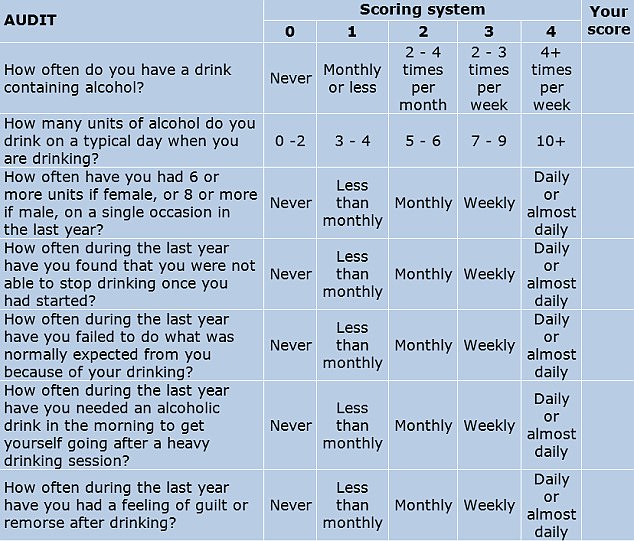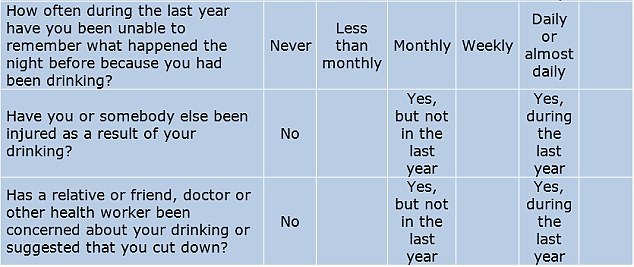Beer fear! What is REALLY happening to your brain the morning after a big night out and how you can combat that crippling ‘hangxiety’
Waking up after a night out, with a pounding headache and hazy memories of the night before, is a situation no one wants to find themselves in.
In addition to the physical hangover symptoms like nausea and dehydration, the dreaded “hangxiety” can be crippling.
The pun about hangover and anxiety describes the feeling you get the morning after drinking, which can last for hours or even days.
You're overwhelmed and paranoid and you're not sure why, replaying the night in your head and thinking about everything you said and did.
MailOnline spoke to experts and doctors about what 'hangxiety' actually is and how you can combat the extreme emotions.
In addition to the physical hangover symptoms like nausea and dehydration, the dreaded “hangxiety” can be crippling
NHS GP, Dr. Hana Patel,explains that some people suffer more from 'hangxiety' than others.
She explained that: 'Research and evidence show that there is a strong link between drinking excessive amounts of alcohol (more than 14 units per week) and depression.
'Hangovers often make you feel anxious and depressed. If you're already feeling anxious or sad, drinking can make this worse, so cutting back can put you in a better mood overall.
'The reason alcohol can make us anxious or depressed is that it is a depressant.
'This means it causes chemical changes in your brain that can initially make you feel calmer and more relaxed.'
However, she adds that when you stop drinking and the effects of alcohol wear off, this “may worsen feelings of anxiety, guilt or shame.”
The doctor continued: 'Drinking alcohol makes us feel dehydrated, affects our sleep and can lower our blood sugar levels, increasing feelings of anxiety.
'Hangxie can affect anyone after drinking alcohol. But while these feelings may be barely noticeable for some, others may experience them as a problem.

NHS GP, Dr Hana Patel, explains that some people suffer from 'hangxiety' more than others
'You may be more sensitive to the effects of hangxiety if you have a history of experiencing anxiety, as alcohol can make it worse.'
Dr. Deborah Lee, from Dr. Fox Online Pharmacylisted typical hangxiety symptoms as: intense worrying, feeling paranoid, difficulty concentrating, rehashing past events, stomach pain, nausea, vomiting, and/or diarrhea.
She explained: 'These symptoms can last from a few hours to 24 hours or more.
“Hangxiety” doesn't mean you're an alcoholic; it can happen to anyone after a hard night out.
“However, if you experience 'hangxiety' it's a sign that it's time to cut down or stop drinking.”
She explained the scientific reason behind the phenomenon: 'Alcohol affects the gamma-aminobutyric acid (GABA) pathway in the brain – the brain's neuroinhibitory pathway.
'When alcohol stimulates the GABA receptor, it turns on this inhibitory system, making you feel disinhibited and relaxed.
'But the next morning, as the alcohol has been metabolized, the brain produces more GABA along with the neurotransmitter glutamate, making you feel more anxious.
“If you already suffer from anxiety, drinking alcohol will likely worsen your anxiety symptoms once the alcohol wears off.”

Dr. Deborah Lee, from Dr. Fox Online Pharmacy, also spoke on the topic
How to stop 'hangxiety'
When it comes to quitting hangxiety, the advice from both experts isn't what drinkers want to hear: it's to stop consuming alcohol altogether.
However, if you don't want to do that, Dr. Deborah Lee recommends that you:
- Do not drink on an empty stomach, eat before going out
- Eat while you drink
- Drink plenty of water, one glass for each alcoholic drink
- Choose low-alcohol drinks. Clear your drinks. Drink soft drinks in between
- Eat a good breakfast the morning after – eggs on toast can provide much-needed protein and carbohydrates, as well as B vitamins. Food helps restore your blood sugar levels.
- Get some exercise – a walk or some gentle yoga. It's not advisable to exercise heavily when you're hungover as you'll likely become dehydrated, but fresh air and a walk can be helpful
- Take medication – there is no perfect hangover cure, but taking paracetamol or ibuprofen for headaches, antacids for acid reflux/indigestion or an anti-nausea drug such as ondansetron for nausea and vomiting can help
- Rest – Try to catch up on lost sleep. Drinking alcohol results in disturbed sleep with less REM sleep and frequent waking during the night
- Relax – Try mindfulness and/or meditation. Take a warm bath or shower and listen to soft music
She also suggests trying “mindful drinking,” which means “deciding what to drink while you're out, sticking to your plan, and enjoying the drinks you drink.”
The doctor explains: 'Mindful drinking is a movement, supported by doctors, to help people reduce their alcohol consumption. It can help reduce your alcohol consumption by 30% or more.”
Mindful drinking is similar to “sober curiosity,” a trend that has recently taken over social media – it's for those who want to reevaluate their relationship with alcohol.
The advice comes just after Millie Gooch, from Kent, spoke out about going from a party girl 'with constant hangxiety' to a sober age of 26.
She started drinking regularly at the age of 18, during freshers' week when she started her English language and literature course at the University of Sussex.
She says the drinking culture meant she was binging several times a week and regularly downing pints of vodka-Red Bull on a night out, but at the time she didn't see a problem with it.
Now she's been sober for more than five years and is “happier than ever” – she runs the Sober Girl Society – a community for sober and down-to-earth, curious women.
Although 'nothing in particular' prompted her to quit, she says she suddenly realized that she did not want to continue living with her alcohol problems.
She said: 'The hangover that made me give up was quite normal for me – nothing life-changing happened, it was nothing crazy.
'But I just had a sense of clarity: I can't keep living like this.
'I didn't want to use drinking to deal with social anxiety; i was tired of going on dates and not being able to remember what happened the night before.
“It was miserable and I was struggling.”
She added, “I just feel a lot calmer now,” she said. 'I can deal with my mental health much better.
'I am much more stable, I no longer create all my own problems and disasters. I'm much happier.'


